May 2023: Olive Tree

Volume VIII/Issue 2/May 2023


From The Editorial Desk
The Ascension of Our Lord Jesus Christ into heaven does not mean His absence but rather His continuous presence in our midst. His presence remains intact through the power of the Holy Spirit. The Holy Spirit is the invisible sign of the unity of the Church. The Apostles and their successors are also the visible sign of unity of the Church. Through the Apostles and their successors, the bishops , the presence of our Lord Jesus Christ are guaranteed.The Apostles and their successors have been given the power to make present the body and blood of our Lord Jesus Christ . Through the power of the Holy Spirit, our Lord Jesus Christ is really present at the Holy Sacrifice of the Mass through the word of consecration pronounced by valid bishops and priests.
Nevertheless, this Real presence of Christ has been greatly destroyed with the Novus Ordo Missae in 1968. Since then there are has been no valid Masses offered. Since then there are no valid bishops and priests, with the exception of some who maintained the Tridentine Latin Mass and valid orders. (i. e. Those who are ordained in pre-Vatican II rite).
But the crisis still remains. There is no Real presence in the majority of the tabernacles in our Catholic Churches now a days. That is the real issue. The Tabernacles are empty. Satan and his cohorts eventually succeed by the advent of the New Mass of Paul VI. And so, true catholics should double their efforts to restore the Real Presence of Christ in our tabernacles i. e. Through the restoration of Tridentine Latin Mass and valid Holy Orders. Only a valid Pope can order that past discipline be restored.
Real Pope is necessary.
It is not enough to have a Valid Holy Mass and valid Holy Orders. A real Pope is necessary. Why? Because the Traditional Catholic Bishops are divided. Each bishop goes as his own. Each bishop is independent but too much independence is bad for the church. However, many bishops, traditional or independent, are enjoying, and are content without having a Pope. Why? I believe it is because they can do what they want to do. And this is bad for the church. Hence, on July 16,1990 despite the silence of many due to indifference and criticism of some who did not want to rock the boat, Pope Michael was elected.
And now that Pope Michael has passed away, the Vatican in exile is in this interregnum. It does not mean that we are leaning back on our laurels doing nothing during this time. Quite the contrary, We are, without ceasing, praying for a new Pope and hoping to elect another one for the greater glory of God. Not out of vain glory but for the edification of the Church.
The Ascension of our Lord Jesus Christ means mission sending for His disciples. Our mission is to make Christ present in the eucharist and that it can be more available to the world. Having a Pope as the visible head of unity is necessary. But for the meantime, a communal discernment must be given a chance. While waiting for the Kairos, let us not forget that Christ has never been absent himself from the true Church, but has through the Holy Spirit, been guiding her.

How Does Your Garden Grow?
There is a nursery rhyme, “Mary, Mary, quite contrary, How does your garden grow?”
Have you thought about your mind and heart as a garden? Consider thoughts as seeds that you plant in the garden of your mind and heart. Only you can determine the seeds you plant. Accept the fact that weeds grow naturally but flowers must be planted. Realize what you sow is what will grow.
If you plant contrary thoughts or seeds of doubt, gloom, frets, bitterness, worry, unbelief and strife, they will become weeds that will spring up to defile many. “Looking diligently that no one fails to obtain the grace of God; that no “root of bitterness” springs up and causes trouble, and by it many become defiled ” (Hebrew 12:15).
If you plant thoughts or seeds of kindness, hope, joy, encouragement, patience and love, they will blossom into flowers that will delight many. Seek to delight, not defile. Since it is your personal garden, you need to be selective and plant the right seed-thoughts that will produce a beautiful garden for others to enjoy.
Remember, what you think is what you will become. “For as he thinketh in his heart, so is he: he thinketh that which he knoweth not. Eat and drink, will he say to thee: and his mind is not with thee.” (Proverbs 23:7).
So, what is growing in your garden? weeds or flowers? Bad seed-thoughts naturally sprout into weeds, while good seed-thoughts must be planted and continually cultivated. No one goes to the garden and pulls out the flowers so the weeds will grow, but you must pull out weeds so flowers can grow.
Good news! You can think only one thought at a time, so the Bible says to “think on these things” and then you will do those things that will produce a beautiful garden. “Whatsoever things are true...honest... just...pure..lovely...of good report... think on these things. Those things, which ye have both learned, and received, and heard, and seen in me, do: and the God of peace shall be with you” (Philippians 4:8-9).
The need is the right seed-thoughts. Plant seed-thoughts that produce. “The peace of God, which passeth all understanding, shall keep your hearts and minds through Christ Jesus” (vs. 7). Notice, what you think in your mind plants seeds into your heart. Both your mind and heart must agree before you can have the peace of God. When there is conflict between your mind (what you think) and heart (you), it produces unrest and stress.
What is in your mind and heart? What results do others see in your garden? As the poem asks, “How does your garden grow?” Is it with bitterness or blessings? peace or stress? weeds or flowers? Remember, the greatest testimony to the world is a changed and consistent Christian life. So, let’s acknowledge Him in all our ways (Proverbs 3:5,6) and bloom where we are planted. “How does your garden grow?”

St. Catherine of Siena

Our Sanctification
“And the very God of peace sanctify you wholly.”—I Thessalonians 5:23
A Parishioner approached the Pastor after he had delivered a powerful homily and said to him, “Sir, I appreciate the wonderful message which you have just given; however, I have a question. Are you sanctified?”
With a smile, he replied, “Madam, my sanctification is actually in three tenses: I have been sanctified, I am being sanctified and I shall be sanctified.”
The lady seemed puzzled. “I do not quite understand you, sir. What I should like to know is, have you had the second blessing?”
The Pastor answered, “Yes, I have had the second blessing and many more than that.”
He was right, for a thorough study of the doctrine of sanctification reveals that it actually is in three tenses. There is evidently much lack of understanding of its fullest meaning; and this is due, no doubt, to a lack of catechizing concerning its significance and application.
The basic meaning of sanctification is “to be separate” or “to be set apart.” By it a person or thing is separated from one use or purpose and set aside to another use or purpose. As a side note ‘Holy’ and ‘sanctify’ are closely related words. To ‘sanctify’ something means to ‘make it holy’ — i.e. ‘sanctification’ is the “process” whereby something goes from being unholy to holy.
The idea as verb or noun is expressed repeatedly in the Scriptures. The verb “sanctify” is used 133 times in both the Old and New Testaments. The noun “sanctification” is used six times in the New Testament only. In the Old Testament the term is applied to days, places, utensils and persons. In the New Testament it is used in reference to Christ and to believers in Him.
Our study here will have to do with sanctification as it applies to the believer in Christ, as it pertains not only to the beginning of the Christian life, but also to its development and ultimate perfected redemption.
Sanctification of the believer is threefold:
-
Positional,
-
Progressive
-
Perfect.
Remembering the words of the Pastor, we see then that the believer is sanctified in the past, the present and the future.
I. Positional Sanctification
By positional sanctification we refer to our standing with God. At our baptism, God has not only justified us, (Justification being the remission of our sins and our entrance into the Christian life, through our baptism), but we are set aside unto Himself. As already said, this sanctification comes about at the moment of being born again at our baptism.
II. Progressive Sanctification
By progressive sanctification, we describe the actual daily experience of separation from sin to God. It is a growth of grace and charity in a person. Once our sins our forgiven we must grow in holiness and will continue to do so throughout our lives until our final judgment.
III. Perfect Sanctification
By perfect sanctification, we refer to the final and complete work of Christ at His coming when He will remove us from all contact with sin. This, of course, has not yet come to pass and will happen only when Christ visibly returns.
New York Catholics outraged by blasphemous transgender art exhibit at Manhattan church
The NYC church that displays the paintings entitled ‘God is Trans’ already defies Catholic teaching with a pro-homosexuality ‘LGBT ministry.’...A spokesperson for the Archdiocese of New York told Newsweek regarding the exhibit, “We had no knowledge of it beforehand. If media reports are accurate, then we would have concerns. We are investigating and looking to speak with the pastor of the parish to get more information.”
Planned Parenthood is now giving transgender drugs to tens of thousands of people
Planned Parenthood offers transgender hormone drugs in at least 31 states as of 2020 and supplied the dangerous drugs to more than 35,000 people in 2021.
Abortion giant Planned Parenthood has expanded its efforts to harm vulnerable Americans by becoming a leading organization facilitating so-called “gender transitions,” according to a new report.
Last week, Live Action released a report on Planned Parenthood’s involvement in the growing trend to mutilate the healthy bodies of gender-confused individuals. The pro-life organization found that Planned Parenthood has become the second-largest group distributing irreversible puberty blockers and cross-sex hormones, in addition to being the nation’s largest abortion provider.
Longtime pro-life activist released from jail after participating in Michigan Red Rose Rescue
A Red Rose Rescuer has been released from jail after 34 days, a sentence dealt by a judge after the pro-lifer participated in a counseling effort to save unborn babies from abortion.
Dr. Monica Migliorino Miller, director of Citizens for a Pro-Life Society, was released from her 45-day sentence early on a Friday morning. Her stay was Judge Cynthia Arvant’s response to a 2022 rescue which took place at a Northland Family Planning abortion facility in Michigan.
King Charles III crowned in Westminster Abbey by the Archbishop of Canterbury
Britain’s King Charles III was crowned on Saturday at Westminster Abbey, London, by the Archbishop of Canterbury, in a ceremony retaining most of its ancient traditions, peppered with a few modern and “interfaith” twists.
Charles III, who became king on September 8, 2022, upon the death of his mother, Elizabeth II, is the supreme governor of the Church of England, in the tradition of the Church’s founder, King Henry VIII, who broke with the Holy See in an effort to divorce his wife and remarry. Accordingly, King Charles III swore on a Bible during the ceremony to maintain in the UK the “Protestant Reformed Religion.”
A new preface was added to the Coronation Oath of 1688, by which Charles III vowed “to foster an environment where people of all faiths and beliefs may live freely.”
In a sharper break with English and Anglican tradition, the ceremony, which is structured around an Anglican Communion service, included female “clergy,” as well as representatives of Buddhist, Hindu, Jewish, Muslim, and Sikh faiths. The Epistle was read by Britain’s Hindu Prime Minister Rishi Sunak.
Biden admin backs down on trying to force Catholic hospital to extinguish sanctuary candle
A Catholic hospital system has emerged victorious after the Biden administration attempted to force it to snuff out a sanctuary candle or forfeit federal funding.
Earlier today, vice president and senior counsel at the Becket Fund for Religious Liberty Lori Windham announced that “the government has seen the light and has abandoned its attempt to force an Oklahoma hospital to blow out a small candle or stop serving elderly, disabled, and low-income patients.”
The Funny Pharmacy
A joyful mind maketh age flourishing: a sorrowful spirit drieth up the bones. - Proverbs 17:22

Frequently Asked Questions

Is Judas in Hell?
The overwhelmingly common interpretation over time of such expressions is that Judas has been, is, and ever will be among the damned. St. John Chrysostom, St. Augustine, St. Thomas Aquinas, St. Alphonsus—the list could go on and on: Judas is clearly in hell.
Notice what Jesus says to His disciples in John 6.
“But there are some of you who do not believe.” (For Jesus knew from the beginning who those were who did not believe, and who it was who would betray him.)” “Jesus answered them, “Did I not choose you, the twelve? And yet one of you is a devil.”
He spoke of Judas the son of Simon Iscariot, for he, one of the twelve, was going to betray him. —Vss. 64, 70, 71.
It is plain from Jesus’ own words that Judas had not believed in Christ. Jesus knew ahead of time that Judas would betray Him. This betrayal is foretold in the Old Testament.
“Even my close friend in whom I trusted, who ate my bread, has lifted his heel against me. ”—Psalms 41:9.
Judas’ “own place”, (Acts 1:25), must have been Hell. Jesus said it would have been better for Judas had he never been born (Matthew 26:24).
For answers to more frequently asked questions, click here: https://www.vaticaninexile.com/frequently_asked_questions.php
The Pope Speaks: Pope Leo XIII
Mary, Guardian of Unity

And so, in Mary, God has given us the most zealous guardian of Christian unity. There are, of course, more ways than one to win her protection by prayer, but as for Us, We think that the best and most effective way to her favor lies in the Rosary. We have elsewhere brought it to the attention of the devout Christian and not least among the advantages of the Rosary is the ready and easy means it puts in his hands to nurture his faith, and to keep him from ignorance of his religion and the danger of error.
The very origin of the Rosary makes that plain. When such faith is exercised by vocally repeating the Our Father and Hail Mary of the Rosary prayers, or better still in the contemplation of the mysteries, it is evident how close we are brought to Mary. For every time we devoutly say the Rosary in supplication before her, we are once more brought face to face with the marvel of our salvation; we watch the mysteries of our Redemption as though they were unfolding before our eyes; and as one follows another, Mary stands revealed at once as God's Mother and our Mother.
The sublimity of that double dignity, the fruits of her twofold ministry, appear in vivid light when in devout meditation we think of Mary's share in the joyful, the sorrowful, the glorious mysteries of her Son. The heart is inflamed by these reflections with a feeling of grateful love toward her and, esteeming everything beneath her as so much worthless chaff, strives with manful purpose to prove worthy of such a Mother and the gifts she bestows. Meditation on the mysteries of the Rosary, often repeated in the spirit of faith, cannot help but please her and move her, the fondest of mothers, to show mercy to her children.


St. Francis de Sales' Introduction to the Devout Life
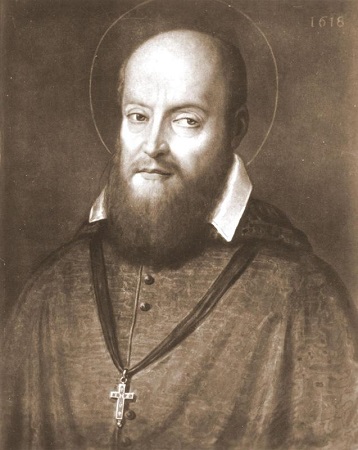
CHAPTER XIII
Seventh Meditation - On Hell
Preparation.
1. Place yourself in God’s Presence.
2. Humble yourself, and ask His Aid.
3. Picture to yourself a dark city, reeking with the flames of sulphur and brimstone, inhabited by citizens who cannot get forth.
Considerations.
1. Even so the lost are plunged in their infernal abyss;—suffering indescribable torture in every sense and every member; and that because having used their members and senses for sin, it is just that through them they should suffer now. Those eyes which delighted in impure vicious sights, now behold devils; the ears which took pleasure in unholy words, now are deafened with yells of despair; and so on with the other senses.
2. Beyond all these sufferings, there is one greater still, the privation and pain of loss of God’s Glory, which is for ever denied to their vision. If Absalom cared not to be released from exile, if he might not see his father’s face, how much sorer will it be to be deprived for ever of the blessed vision of God?
3. Consider how insupportable the pains of Hell will be by reason of their eternal duration. If the irritating bite of an insect, or the restlessness of fever, makes an ordinary night seem so long and tedious, how terrible will the endless night of eternity be, where nought will be found save despair, blasphemy and fury!
Affections and Resolutions.
1. Read the Prophet’s descriptions of the terrors of the Lord, and ask your soul whether it can face them—whether you can bear to lose your God for ever?
2. Confess that you have repeatedly deserved to do so. Resolve henceforth to act differently, and to rescue yourself from this abyss. Resolve on distinct definite acts by which you may avoid sin, and thereby eternal death.
Conclusion.
1. Give thanks, offer, pray.
Saints from East and West

May 15 - Saint John Baptist de la Salle.
The founder of the Institute of the Brothers of the Christian Schools was born at Rheims on April 30, 1651. His parents were both of noble family.
From the instructions of a devout mother, the boy, John Baptist, early gave evidence of such piety that he was designated for the priesthood. He received the tonsure when he was only eleven, and became a member of the cathedral chapter of Rheims at the age of sixteen; in 1670 he entered the seminary of St Sulpice in Paris, being ordained priest in 1678. A young man of striking appearance, well connected, refined and scholarly, he seemed assured of a life of dignified ease or of high preferment in the Church. But God in His providence had other designs for him, of which he himself had no presentiment, apparently not even when one of his fellow canons on his deathbed committed to his care the spiritual direction of a girls' orphanage and school as well as of the sisters who conducted it.
But in 1679 he met a layman, Adrian Nyel, who had come to Rheims with the idea of opening a school for poor boys. Canon de la Salle gave him every encouragement, and, somewhat prematurely, two schools were started. Gradually the young canon became more and more drawn into the work and grew interested in the seven masters who taught in these schools. He rented a house for them, fed them from his own table, and tried to instil into them the high educational ideals which were gradually taking shape in his own mind. In 1681, though their uncouth manners repelled him, he decided to invite them to live in his own home that he might have them under his constant supervision. The result must have been a great disappointment. Not only did two of his brothers indignantly leave his house - a step he may have anticipated, for "ushers" were then ranked with pot-boys and hucksters -but five of the schoolmasters soon took their departure, unable or unwilling to submit to a discipline for which they had never bargained. The reformer waited, and his patience was rewarded. Other men of a better type presented themselves, and these formed the nucleus of what was to prove a new congregation. To house them the saint gave up his paternal home, and moved with them to more suitable premises in the Rue Neuve. As the movement became known, requests began to come in from outside for schoolmasters trained on the new method, and de la Salle found his time fully engrossed. Partly for that reason, and partly because he realized the contrast his disciples drew between his assured official income and their own uncertain position, he decided to give up his canonry. This he did.
The next question for consideration was the use he should make of his private fortune, which he no longer wished to retain for his own use. Should he employ it for the infant community, or should he give it away? He went to Paris to consult Father Barre, a saintly man greatly interested in education, whose advice had helped him in the past. Father Barre was strongly opposed to the idea of endowment. "Si vous fondez, vous fondrez" ("If you endow, you will founder"), he said, and the saint, after fervent prayer for light, determined to sell all he had and to distribute the proceeds to the poor - who at that time were in the direst need, as a famine was raging in Champagne. His life from that time became even more austere. He had naturally a very delicate palate, but he deliberately starved himself until hunger enabled him to swallow any food, however coarse or ill-prepared.
Four schools were soon opened, but de la Salle's great problem at this stage was that of training teachers. Eventually he called a conference of twelye of his men, and it was decided to make provisional regulations, with a vow of obedience yearly renewable until vocations became certain. At the same time a name was decided upon for members of the community. They were to be called the Brothers of the Christian Schools. The first serious trial that befell them was illness amongst the brothers. De la Salle seems to have attributed this visitation to his own incapacity to rule, and he consequently persuaded his disciples to elect another superior. No sooner, however, did this become known than the archiepiscopal vicar general ordered him to resume his office. His wisdom and his guiding hand were indeed necessary, for external pressure was about to cause unforeseen developments in the new congregation - developments which would greatly widen its field of operation. Hitherto recruits had been full-grown men, but now applications began to be received from boys between the ages of fifteen and twenty. To reject promising lads at a malleable age might mean losing them altogether, and yet they were not old enough to be subjected to a rule framed for adults. De la Salle, in 1685, accordingly decided to set up a junior novitiate. He lodged the youths in an adjoining house, gave them a simple rule of life, and entrusted their training to a wise brother, whilst retaining supervision of them himself. But soon there appeared another class of candidate who also, like the boys, could not well be refused and who likewise required to be dealt with apart. These were young men who were sent by their parish priests to the saint with a request that he would train them as schoolmasters, and send them back to teach in their own villages. He accepted them, found them a domicile, undertook their training, and thus founded the first training-college for teachers, at Rheims in 1687; others followed, at Paris (1699) and at Saint-Denis (1709).
All this time the work of teaching poor boys had been steadily going on, although hitherto it had been restricted to Rheims. In 1688 the saint, at the request of the curé of St Sulpice in Paris, took over a school in that parish. It was the last of seven free schools founded by M. Olier, which had eventually been compelled to close for lack of satisfactory teachers. The brothers were so successful that a second school was opened in the same district. The control of these Paris foundations was entrusted to Brother L'Heureux, a gifted and capable man whom de la Salle designed to be his successor, and whom he was about to present for ordination. It had been his intention to have priests in his institution to take charge of each house, but Brother L'Heureux's unexpected death made him doubt whether his design had been according to God's will. After much prayer it was borne in upon him that if his order was to confine itself strictly to the work of teaching, for which it had been founded, and to remain free from "caste" distinctions the brothers must continue to be laymen. He therefore laid down the statute - perhaps the most self-denying ordinance which could be imposed upon a community of men - that no Brother of the Christian Schools should ever be a priest, and that no priest should ever become a member of the order. That regulation is in force to this day. Troubles which had affected the work during the founder's absence in Paris led him afterwards to take a house at Vaugirard to serve as a retreat where his sons could come to recruit body and spirit; it also became the novitiate-house. Here, about 1695, de la Salle drew up the first draft of the matured rule, with provision for the taking of life vows. Here also he wrote his manual on the Conduct of Schools in which he sets forth the system of education to be carried out - a system which revolutionized elementary education and is successfully pursued at the present day. It replaced the old method of individual instruction by class teaching and the "simultaneous method." It insisted on silence while the lessons were being given, and it taught in French and through French - not through Latin. Up to this period the schools opened by the brothers had all been intended for poor children, but in 1698 a new departure was made at the request of King James II of England, then an exile in France. He wanted a college for the sons of his Irish adherents, and at his request the saint opened a school for fifty boys of gentle birth. About the same time he started for the benefit of youths of the artisan class the first "Sunday academy," in which more advanced instruction was combined with religious teaching and exercises, and it at once became extremely popular.
St John Baptist de la Salle had not been able to carry out all these schemes without experiencing many trials. He had heartrending disappointments and defections amongst his disciples, and bitter opposition from the secular schoolmasters, who resented his intrusion into what they regarded as their special preserves. At one time the very existence of the institute seems to have been jeopardized through the injudicious action of two brothers occupying posts of authority. Complaints of undue severity towards novices reached the archbishop of Paris, who sent his vicar general to make investigations. The brothers unanimously exonerated their superior from blame in the matter, but the vicar general was prejudiced and drew up an unfavourable report. The result was that St John Baptist was told to regard himself as deposed - a verdict he received without a murmur. When, however, the vicar attempted to impose on the brothers a new superior - an outsider from Lyons - they indignantly exclaimed that M. de la Salle was their superior, and that they would one and all walk out of the house rather than accept another. Though the saint afterwards induced them to make a formal submission, the fresh appointment was allowed to lapse, and the founder remained in charge of his congregation. Somewhat later than this the removal of the novitiate from Vaugirard to larger premises inside Paris, together with the opening of new schools in connection with it, led to a violent organized attack on the Paris schools in which the lay schoolmasters were joined by the Jansenists, and by those who, on principle, were opposed to education other than manual for the children of the poor. St John Baptist found himself involved in a series of lawsuits, and obliged to close all his Parisian schools and houses. Eventually the storm died down, the persecution ended as suddenly as it had begun, and before long the brothers were able to resume and even extend their educational work in the capital.
Elsewhere the institute had been steadily developing. As early as 1700 Brother Drolin had been sent to found a school in Rome, and in France schools were started at Avignon, at Calais, in Languedoc, in Provence, at Rouen, and at Dijon. In 1705 the novitiate was transferred to St Yon in Rouen. There a boarding school was opened, and an establishment for troublesome boys, which afterwards developed into a reformatory school. From these beginnings grew the present worldwide organization, the largest teaching order of the Church, working from primary schools to university colleges. In 1717 the founder decided finally to resign; from that moment he would give no orders, and lived like the humblest of the brothers. He taught novices and boarders, for whom he wrote several books, including a method of mental prayer. St John Baptist lived at an important period in the history of spirituality in France, and he came under the influence of Berulle, Olier, and the so-called French "school" of de Rance and of the Jesuits, his friends Canon Nicholas Roland and the Minim friar Nicholas Barre being specially influential. On the negative side he was distinguished by his strong opposition to Jansenism, illustrated positively by his advocacy of frequent and even daily communion. In Lent, 1719, St John Baptist suffered a good deal from asthma and rheumatism, but would give up none of his habitual austerities. Then he met with an accident, and gradually grew weaker. He passed away on Good Friday, April 7, 1719, in the sixty-eighth year of his age.
The example of St John Baptist de la Salle may well lead everyone of us to ask himself: "What have I done to help and to encourage this most necessary and divine work? What sacrifices am I prepared to make that the Christian education of our children may be carried on in spite of all the hindrances and hostilities which beset it?" The Church has shown her appreciation of the character of this man, a thinker and initiator of the first importance in the history of education, by canonizing him in 1900, and giving his feast to the whole Western church; and in 1950 Pope Pius XII declared him the heavenly patron of all schoolteachers.

Advice You Can Bank On
A Catholic Perspective On Finances
May 2023 – Why We Should Live Simply
Let me start by telling you an imaginary story to illustrate my point. A traveler came to my house from Washington, D.C. To California by bicycle. He was a young college student and he wanted to be back in California in time to start the fall semester. I invited him to stay at the the house to rest for several days before he started out again. I was surprised the next day when he asked me to take him into town so he could stock up on supplies when I found out what he wanted. He went to a used furniture store and bought a bed, a rocking chair, and a bathtub in which to take a bath.
I asked him what he wanted with these things, and he said he was getting pretty tired of not being able to sleep in his own bed, and one of his favorite spots in which to relax after the evening meal was in a rocking chair. He went on to say that a few times when he was camping out in the woods, he wished for a bathtub in which to take a bath.
When I wondered how he would take these things with him, he thought he might be able to balance the rocking chair on his bike, and he planned to build a small trailer to pull behind his bike that he would load up with the bed and bathtub.
As I mentioned, this story never happened-I have given it as an illustration of how hard it would be for us to imagine a traveler being so foolish. Yet, the truth is many travelers on the journey of life are acting more foolishly, and because so many are doing it, no one thinks it odd.
And we are indeed on a journey. We are making a trip from our birth to our death-every one of us. We are traveling toward eternity.
There actually was a young man who came to my house, traveling by bicycle from Washington, D.C. to California. But you may be sure he was not interested in taking, or even tempted to take, a rocking chair. He was much too serious about his trip to delay, load, and hinder himself with something like that. He made careful choices in what he took along and what he decided to leave. His goal was not to enjoy himself, but to get to his destination.
I grew up singing a protestant hymn called, “This world is not my home”. The first verse started like this: “This world is not my home I'm just a-passing through”. It was a great song, but the problem was most of us was singing these words, were entangled with the affairs of life. Many people measure how successful a person is by how many material possessions he accumulates in this life. But Jesus gave us another rule by which to measure. He said, “A mans life does not consist in the abundance of things he possesses.
The Apostle Paul reminds us that as Christians we must be willing to “endure hardship as a good soldier of Jesus Christ.” Then he points out that “no one engaged in warfare entangles himself with the affairs of this life, that he may please him who enlisted him as a soldier (II Timothy 2:3-4).
The story is told of an Amish farmer who brought a casserole to welcome a new family moving into a neighboring farmhouse. He helped then unpack one appliance after another-washer, dryer, television, stereo, phonograph, (Yep! Somethings from back in the day), tape deck, compact disk player, computer, dishwasher, dish washer, coffee maker, hair dryer, and electric tools.
“If any of these break down,” the Amish man said to the newcomers, “please let me know, and I'll come over.”
“That's very kind of you,” they replied gratefully. “Can you fix things?”
“No, said the farmer, “but I can teach you how to live without them.”
A consumer oriented society has taught us to think only negatively of living without thins, making us believe that this is a misfortune. Many people look at how we live and wonder why deny ourselves certain comforts. Why do we do without some of things that most other people in North America buy and use freely? In order to understand the Christian thinking behind living simply, we need to keep in mind that we are travelers. Our Master instructed us to despise the things of the world and not permit them to sidetrack us or weigh us down in our journey toward eternity.
In order to understand the benefits of simple living, you need to remember that they apply only to people who are not at home here in this world, for those who sincerely are convinced that our sojourn on earth is just a short introduction to life. Our home is elsewhere and we desire to travel with speed. We are in enemy territory and we dare not linger. Here we are travelers, strangers, and pilgrims, just passing through in search of a better home. If we meant to stay here, it would make sense to accumulate and enjoy all the earthly comforts. If this life is all there were-if there were no eternity-then yes, the more find food that we can eat, the more wealth we can pile up...but no, this is an illusion. This is vanity. No one is here to stay-some just make themselves believe they are. We came into this world with nothing, and we going to leave it the same way.
If the destination is all important, it just makes sense to travel lightly. That is one reason we live simply-because we are travelers.

 Family Matters
Family Matters
Losing a Baby And Finding Hope Part 2
Taken from the pages of the book “A Child At Any Cost” Edited and shortened for this article. If you desire a copy of the book please contact us at Vaticaninexile@gmail.com for information on how to get it.
Shattered Hopes
It is amazing how the course of your life can chane in an instant. Those few words changed my world. More than that, they shattered it. The reality of those words stunned me. I drove home feeling numb. To my relief Harry was at home. I threw myself into his arms as my feelings boiled over. A floodgate had been opened to to despair and tears. Words that ad taken only a few seconds to utter had crushed all my hopes and dreams.
I cried and cried. Then I began to express my thoughts, “Why Lord? How could You do this to me? Why did You let me get pregnant in the first place. I'd already accepted the likelihood that the treatment had probably not worked. I was quite happy and content till you let all this happen.”
I felt terribly frightened. It seemed such a cruel blow. God was in charge of my life and therefore I reasoned that God had done this to me. The possibility that God might actually be cruel was devastating. I thought I knew what God was like and I trusted Him. I was swamped by grief and my thoughts were wild and uncontrollable.
I felt dreadful about having to go to the hospital the next day to have my baby removed. But I will never forget the amazing sense I had of God's presence with me at that time. Even though I was mentally yelling abuse at Him and was angry at His apparent cruelty to me. He tenderly drew near and it was as if He carried me in His arms through those days. I came round from the anesthetic with such peace that I knew it was supernatural, and God's gift to me.
Had God Failed Me?
Four days after getting home from the hospital I was confused and perplexed. The hardest thing I faced in the whole experience was not losing my baby but feeling that somehow God had let me down. If your husband or close friend lets you down it is hard enough. But how could I cope if I believed that God Himself really had failed me?
I tried reasoning with myself, “If I just understood why it happened then I'd be able to cope.”
Each day was dark, despite the beautiful spring weather. I thought I would never be able to sense joy and happiness again. Depression was a new experience for me. In the past at times I had felt pretty low but this was something different. For the first time I understood how others suffering from depression must feel.
In the past whenever I had been in situations which were sad and difficult I had run straight to God for help and comfort. But now I was unsure whether God would help me. How could I trust Him for anything again? I was angry and resentful about the way God had treated me.
My thoughts in the car ion the way to the antenatal clinic returned to me. I remembered how I prayed, “Lord I love You more than I love my baby-You are more important to me.” Had I prayed honestly and meant what I said or not? Or were those just empty words, spoken because I had been confident that God would never take my baby from me?

Lamp and Light Commentary

"Thy word is a lamp to my feet, and a light to my paths." (Psalms 119:105)
Genesis 12: Abraham-A Flawed Man Living By Faith
In Genesis chapter 12:1, we see the beginning of the building of the true Jerusalem. This began with Abraham through whom came the nation of Israel the capital of which was Jerusalem. There would have been no Jerusalem if there had been no Abraham. We observe in Abraham something completely different from what we saw in Babylon last week. It says, “And the Lord said to Abram: 'Go forth out of thy country, and from thy kindred, and out of thy father's house, and come into the land which I shall shew thee.'”
Abraham didn't suddenly get a bright idea one day like these people in Babel, and say, “I think I have lived long enough in Ur. Let me move to Canaan and do something there.” No. His move was dictated by God. Abraham was 75 years old. It is good to wait for even 75 years to hear God and then move. Moses waited for 40 years as a shepherd and then moved, when God spoke to him. And think of what he accomplished! I am not saying we must wait for 75 or 80 years. All I am saying is that we must wait until we hear from God and then move. But, do you think today's busy man has time for that? I don't think so.
Be careful about who you let move you. Let God be the one that moves you. Many people may urge you to do various things. Listen to their advice, but don't move until God also speaks to you. Wait until you hear God, because It will end up disastrously, if you listen to the opinions of men. I am not saying that we should not consider the opinions of our Authorities over us. We all have authorities over us. Whether Parents, Husbands, The Church leaders, etc. But I am saying that the final voice we hear must be God's. God told Abraham to “Go” and he went. God told Moses to “Go,” and he went. God told Paul to “Go” an he went. These are the people who accomplished something with their lives. Today people run around trying to do something or the other for God. But they accomplish nothing of eternal value. Statistics-wise, what they do may be impressive. But it's all religious Babylon, and not Jerusalem.
“Babylon says “Come, lets move. Let's do something for the Lord. Let's make bricks, let make mortar, let's do something.” You can impress men. “Let us make a name.”, Babylon would say. And you may make a great name for yourself building Babylon-like Nebuchadnezzar did. This is happening today in Christian work and that is the message in Revelation 17 and 18. But Abraham waited for God's “Go.”
Notice that whenever Abraham moved with out the leading of God, he got into trouble.
For example: We read that God had told Abraham to leave Ur of the Chaldees and to go where He would lead him. But in Chapter 11:31 we read that it was Terah, Abrahams father, who took Abraham and moved out of Ur. But what had God told Abraham? Leave “thy kindred, and thy father's house, unto a land that I will shew thee:” but here we see the 75 year old Abram holding his Daddy's hand and moving out! That was how Abraham started!!
The ones who will hinder you from doing the will of God will tend to be your relative first of all- your parents, your brothers, your sisters, your wife and your children. Jesus said, “If any man come to me, and hate not his father, and mother, and wife, and children, and brethren, and sisters, yea and his own life also, he cannot be my disciple.” (Luke 14:26) You may want to follow the Lord. But you father or your wife may say, “No”!
So Terah took Abraham, and they came as far as Haran (11:31) and settled there. That was not God's will. Why did they settle there? That was Terah's idea. Haran perhaps had good pasture land for the flocks. But it was not God's place. And Abram settled down there with his Daddy! Abram was a man who made mistakes. And the first mistake he made was to listen to his father, when God had already told him to do something else. So what did God do? God can easily deal with such situations. He took away Terah through death. (11:32)! Then, “Abram went out as the Lord had commanded him”. (12:4)
Do you have to wait until God does something drastic like that before you move on? If God loves you, He will do something drastic like that, But if God sees that you yourself are a compromiser, He may allow you to stay on in Haran all your life and miss the will of God totally. Learn to move with God. So how do you hand those who are in authority who are telling you to do opposite of what you know God desires of you?
Well first we must understand the principles God has laid out for us concerning Authorities in our lives.
There are 3 basic purposes for authority.
To Grow in Wisdom and Character
The only recorded incident in scripture that references the life of Christ between the ages of two and thirty was a discussion with His parents which involved authority. This occurred when He was twelve.
Should He follow his spiritual calling and be about His Father's business or should He become subject to His parents and leave His ministry at the temple?
And he said to them: How is it that you sought me? did you not know, that I must be about my father' s business? (Luke 2:49)
He chose to do the latter, and the following verse reports,
And Jesus advanced in wisdom, and age, and grace with God and men. (Luke 2:52)
He advanced in these things, while being under the authority of His parents.
To Gain Protection From Destructive Temptations
The nature of submission is not "getting under the domination of authority but rather getting under the protection of authority".
Authority is like an "umbrella of protection", and when we get out from under it, we expose ourselves to unnecessary temptations which are too strong for us to overcome.
Because it is like the sin of witchcraft, to rebel: (I Kings 15:23)
Both Terms, Rebellion and Witchcraft, have the same basic definition which is- subjecting ourselves to the realms and power of Satan. So when someone rebels against the Authority that God has put in there lives, it is just like witchcraft. They are subjecting themselves to the realms and power of Satan.
To Receive Clear Directions for Life Decisions
Correct decisions are based on faith; that is, visualizing what God intends to do.
For all that is not of faith is sin. (Romans 14:23)
One of the most basics aspects of faith is to realize how God gets His directions to us through those He has placed over us.
After the centurion asked Jesus to come and heal his servant, it occurred to him that just as his life was structured around a "chain of responsibility," so the kingdom in which God operates must have a similar structure of authority.
When Jesus realized that he understood this, Jesus "marvelled; and said to them that followed him: Amen I say to you, I have not found so great faith in Israel." (Matthew 8:10)
Our faith multiplies as we see how God speaks to us through those He has placed over us. Each of us has a multitude of character deficiencies that need to be perfected. God uses those in authority to do this.
In the case of a child the bible says,"Folly is bound up in the heart of a child, and the rod of correction shall drive it away." (Proverbs 22:15)
God assures us that the heart of one who is in authority is in His hand, and that He turns it in the same way He does a winding river by using the pressure of the current and time.
"As the divisions of waters, so the heart of the king is in the hand of the Lord: whithersoever he will he shall turn it." (Proverbs 21:1)
God is even more concerned that our character become like Christ Jesus then He is in which "instruments" He uses to accomplish this. Therefore, if we push away or get out from under the reproofs and authority of our parents, God only has to raise up new "tools" to chip away at the rough edges of our character.
There are Four Basic Structures of Authority
1. (Family)-Father-Mother-Children
Children, obey your parents in all things: for this is well pleasing to the Lord. (Colossians 3:20)
Children, obey your parents in the Lord, for this is just. Honour thy father and thy mother, which is the first commandment with a promise: That it may be well with thee, and thou mayest be long lived upon earth. (Ephesians 6:1-3)
My son, keep the commandments of thy father, and forsake not the law of thy mother. Bind them in thy heart continually, and put them about thy neck. (Proverbs 6:20-21)
The eye that mocketh at his father, and that despiseth the labour of his mother in bearing him, let the ravens of the brooks pick it out, and the young eagles eat it. (Proverbs 30:17)
A fool laugheth at the instruction of his father: but he that regardeth reproofs shall become prudent. (Proverbs 15:5)
2. (Church)-Pope-Bishops-Priest-Members of the Church
And we beseech you, brethren, to know them who labour among you, and are over you in the Lord, and admonish you: That you esteem them more abundantly in charity, for their work' s sake. Have peace with them. (I Thessalonians 5:12,13)
Obey your prelates, and be subject to them. For they watch as being to render an account of your souls; that they may do this with joy, and not with grief. For this is not expedient for you. (Hebrews 13:17)
Let the priests that rule well, be esteemed worthy of double honour: especially they who labour in the word and doctrine: For the scripture saith: Thou shalt not muzzle the ox that treadeth out the corn: and, The labourer is worthy of his reward. (I Timothy 5:17,18)
The ancients therefore that are among you, I beseech, who am myself also an ancient, and a witness of the sufferings of Christ: as also a partaker of that glory which is to be revealed in time to come: Feed the flock of God which is among you, taking care of it, not by constraint, but willingly, according to God: not for filthy lucre' s sake, but voluntarily: Neither as lording it over the clergy, but being made a pattern of the flock from the heart. (I Peter 5:1-3)
3. (Government)-National Leaders-Local Officials-Citizens
Be ye subject therefore to every human creature for God' s sake: whether it be to the king as excelling; Or to governors as sent by him for the punishment of evildoers, and for the praise of the good: (I Peter 2:13,14)
Let every soul be subject to higher powers: for there is no power but from God: and those that are, are ordained of God. (Romans 13:1)
For princes are not a terror to the good work, but to the evil. Wilt thou then not be afraid of the power? Do that which is good: and thou shalt have praise from the same. For he is God' s minister to thee, for good. But if thou do that which is evil, fear: for he beareth not the sword in vain. For he is God' s minister: an avenger to execute wrath upon him that doth evil. (Romans 13:3-4)
Wherefore be subject of necessity, not only for wrath, but also for conscience' sake. (Romans 13:5)
For therefore also you pay tribute. For they are the ministers of God, serving unto this purpose. Render therefore to all men their dues. Tribute, to whom tribute is due: custom, to whom custom: fear, to whom fear: honour, to whom honour. (Romans 13:6-7)
4. (Business)-Employer-Employees
Servants, obey in all things your masters according to the flesh, not serving to the eye, as pleasing men, but in simplicity of heart, fearing God. (Colossians 3:22)
Whatsoever you do, do it from the heart, as to the Lord, and not to men: Knowing that you shall receive of the Lord the reward of inheritance. Serve ye the Lord Christ. (Colossians 3:23-24)
Servants, be subject to your masters with all fear, not only to the good and gentle, but also to the froward. (I Peter 2:18)
Whosoever are servants under the yoke, let them count their masters worthy of all honour; lest the name of the Lord and his doctrine be blasphemed. (I Timothy 6:1)
But they that have believing masters, let them not despise them, because they are brethren; but serve them the rather, because they are faithful and beloved, who are partakers of the benefit. These things teach and exhort. (I Timothy 6:2)


Books to feed your faith!
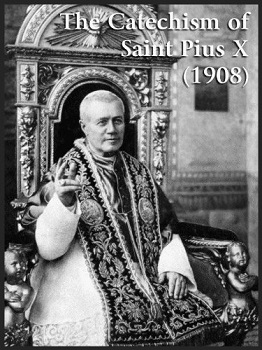
Catechism of Saint Pius X
$14.95
The Fathers of the Council of Trent showed at a very early date that they were satisfied with none of the existing works, and that they were fully alive to the need and necessity of preparing an authoritative Catechism. The realisation of their desire, however, was retarded for several years by events over which they had little control; and when the work was finally taken in hand another idea prevailed, resulting in the publication of a manual for the use of the clergy, and not, as originally suggested, a Catechism for children and uninstructed adults. Of the countless Catechisms that continued to appear, two — those of Bellarmine and Canisius — have steadily held their ground ever since, and to a large extent have served as the models of nearly an subsequent compilations of the kind. The influence of Canisius, however, has on the whole been limited to Germany; whereas Bellarmine's Catechism , which was written by command of Pope Clement VIII in 1597, has been copied in almost every other country in the world. At an early date it was translated into Arabic, Latin, Modern Greek, French, Spanish, German, English, and Polish. It had the warm approbation of Clement VIII, who prescribed it for use in the Papal States; of Urban VIII, who directed it to be adopted in all the Eastern missions; of Innocent XIII and Benedict XIV; particularly of the very important Council of all Italy, held at Rome, in 1725, which made it obligatory in all the dioceses of the peninsula; and finally of the Vatican Council which indicated it as the model for a proposed universal Catechism. Though Bellarmine's Catechism was largely followed as a model all over the world, yet, owing to the modifications introduced in diocesan editions, it came to pass in the course of time that almost every diocese had its own Catechism, differing in many respects from the Catechisms of other dioceses. The obvious inconvenience of this bewildering multiplicity of Catechisms occupied the attention of the Fathers of the Vatican Council, the great majority of whom were agreed as to the desirability of having a uniform small Catechism for the faithful all over the world. Early during the sittings of the Council, forty-one of the assembled Fathers devoted six sessions (February 10 to February 22) to an examination of the question; and the report which they drew up occupied the attention of the whole Council during the sittings of April 29 and 30. The question being put to a vote on May 4, an immense majority was found to be in favour of the compilation of a small uniform Catechism, to be compiled in Latin, translated into every language, and made obligatory in every diocese. But the approach of the Italian troops towards the walls of Rome brought the Council to an untimely end and there was no time to promulgate the constitution on the proposed uniform Catechism, so that it has not the force of law. The idea, however, has never been lost sight of. During the sitting of the first Catechetical Congress in 1880, the then Bishop of Mantua (later St. Pius X) proposed that the Holy Father be petitioned to arrange for the compilation of a simple, plain, brief, and popular Catechism for uniform use all over the world. Shortly after his elevation to the Chair of Peter, Pius X at once set about realising, within certain limits, his own proposal of 1880, by prescribing a uniform Catechism — the Compendium of Christian Doctrine — for use in the dioceses of the ecclesiastical province of Rome, at the same time indicating that it was his earnest desire to have the same manual adopted all over Italy. The text selected was, with slight modifications, that which had been adopted for some years by the united hierarchy of Piedmont, Liguria, Lombardy, Emilia, and Tuscany.

The Little Office of the Blessed Virgin Mary
$14.99
Originally published in 1915, this work is in conformity with the Decrees in place for the Little Office before Vatican II, which is the Traditional Little Office. The Little Office of the Blessed Virgin is one of the liturgical prayers of the Church, and she imposes it "on many of her children. Although the Little Office of Our Lady is considerably shorter than the ever-varying Office which the Clergy and Religious in solemn vows have to say, yet, coming as it does from the same authority, it is as much a liturgical prayer as the . Divine Office, and has the same claims to be considered a part of the official worship which the mystical Spouse of Christ, the Church, daily offers to her Divine Head. Prayer is the great duty of man here below: " We ought always to pray and not to faint" (Luke xviii. I). We appear before God under three different aspects: as individuals, as members of congregations or societies, and as members of a Divine Society. Hence there are three kinds of prayer: (I) private prayer, (2) prayer in common, and (3) the prayer of the Church, or liturgical prayer. Of the first kind, private prayer, Our Lurd spoke when He said: "But thou when thou shalt pray, enter into thy chamber, and having shut the door, pray to thy Father in secret, and thy Father who seeth in secret will repay thee" (Malt. vi. 6). The second kind, prayer in common, is that which we offer as members of congregations or societies. The prayers said by the members of a family, such as morning and night prayers, the prayers said together by the members of a congregation or a community, are better than individual prayers. Our Lord praised this kind of prayer when He said: "If two of you shall consent upon earth, concerning anything whatsoever they shall ask, it shall be done to them by My Father who is in heaven. For where there are two or three gathered together in My Name, there am I in the midst of them " (Matt. xviii. 19, 20). The third kind, liturgical prayer, is much more pleasing to God; it excels both private prayer and prayer in common. It is the prayer we offer as members of a Divine Society, the Holy Church. The public prayer of the Church may be looked upon as the public act of the whole body of the Church. Those who by their Rule, approved by the Church, are charged with saying the Office, whether it be the Divine Office or the Little Office of the Blessed Virgin, say it as public officers of the Church, who officially stand before the throne of God and make intercession for the whole body of Christ's Church. When performing this duty, even when alone, they cease to be private individuals; they are invested with the public character of ambassadors to the heavenly Court. But an ambassador's personal merit is of very secondary concern: What does matter is the dignity and power of him who sent the ambassador, and whom he represents. Those who take part in this public Office do not stand before God in their own name, nor yet in the name of the faithful assembled, but in the name of the Holy Church appointed by God. Her service and prayer do not partake of the worth and devotion of the .angels, but of the worth of the mystical body of Christ. This prayer of the Church is the most excellent of prayers. Private prayer and prayer in common are doubtless very good, and highly pleasing to God; but they are human prayers, necessarily defective, made and said by men who are sinners, and not always altogether pleasing to God.
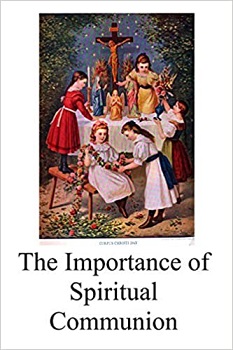
The Importance of Spiritual Communion
Kindle $2.99 / Paperback $5.99
If we cannot receive Holy Communion actually, then let us do so spiritually. These prayers and instructions have been gathered from the Saints and other venerated spiritual writers. Spiritual Communion has been a part of the spiritual life for decades. Growing up I was instructed to make a Spiritual Communion, when I could not go to Communion such as when I assisted at a second Mass. The same is true if one finds oneself at Mass, but not fasting. There are times coming, when it will be difficult, if not impossible to assist at the Holy Sacrifice of the Mass. We should be prepared for such times.

Brother Argus Parker's Strawberry Banana Bread

Ingredients
4 eggs, lightly beaten
2 cups white sugar
1 1/2 cups strawberries, mashed
1 cup mashed bananas
1 tablespoon orange zest
1 cup vegetable oil
3 cups all-purpose flour
1 teaspoon baking soda
1 1/2 teaspoons ground cinnamon
1/2 teaspoon salt
1/4 teaspoon ground nutmeg
1 cup chopped walnuts
Directions
1. Preheat oven to 350 degrees F (175 degrees C). Grease two 9x5 inch pans.
2. In a medium bowl, mix together flour, baking soda, cinnamon, salt, and nutmeg.
3. In a large bowl, combine eggs, sugar, strawberries, bananas, orange peel, and oil. Beat with an electric mixer at medium speed for 2 minutes. Add flour mixture, and stir just until moistened. Stir in walnuts.
4. Bake for 1 hour, or until loaves test done. Remove to wire rack to cool.
Miroslav's Chicken Kebabs

Ingredients
½ cup olive oil
½ cup ranch dressing
3 tablespoons Worcestershire sauce
1 tablespoon minced fresh rosemary
2 teaspoons salt
1 teaspoon lemon juice
1 teaspoon white vinegar
¼ teaspoon ground black pepper, or to taste
1 tablespoon white sugar, or to taste (optional)
5 skinless, boneless chicken breast halves - cut into 1 inch cubes
Directions
1. In a medium bowl, stir together the olive oil, ranch dressing, Worcestershire sauce, rosemary, salt, lemon juice, white vinegar, pepper, and sugar. Let stand for 5 minutes. Place chicken in the bowl, and stir to coat with the marinade. Cover and refrigerate for 30 minutes.
2. Preheat the grill for medium-high heat. Thread chicken onto skewers and discard marinade.
3. Lightly oil the grill grate. Grill skewers for 8 to 12 minutes, or until the chicken is no longer pink in the center, and the juices run clear.
Video sermons and instructions: Timeless timely truths for living the Faith
Fifth Sunday after Easter, 2013.
Ascension 2013.
The Sunday after the Ascension, 2013.
Lamp and Light: Gospel of Matthew 3:1-6, Part 2
Vatican In Exile Podcasts
Family Theater
Family Theater was a program created to promote family unity and each week saw a drama illustrating the importance of family life and prayer. The main reason for the success of this series was undoubtedly due to the numerous Hollywood stars that participated.
Cast: Bing Crosby, Gary Cooper, James Stewart, Gregory Peck, Shirley Temple Director: Fred MacKaye, Dave Young, Joseph Mansfield, Richard Sanville, Jaime del Valle, Mel Williamson, Robert O’Sullivan, John Kelley Producer: Father Patrick Peyton, Bob Longenecker Host: Father Patrick Peyton Writer: True Boardman , Father Patrick Peyton Announcer:Tony LaFrano
Ranger Bill
Ranger Bill was a Christian radio adventure serial, and aimed at the younger generation. This turned out to be one of the most successful radio broadcasts, and with an amazing longevity of over twelve years. The very first fifteen minute episode was aired on October 2, 1950, but this later changed to a half hour episode, beginning May 14, 1954 and running right through until 1962.
Catechism Corner
Catechizing with a fresh perspective. Using the Holy Scriptures and the Catechism of the Council of Trent as foundational bases.
Lamp and Light Bible Study
Lamp and Light Bible Study is not a ‘theological’ study but a ‘life application’ study.
Our in house Priest will show that every single book of the Bible is interesting and has a message for us today. It deals with key aspects of the Christian life and speaks more to the heart than to the head.
Sunday Sermon
The Ave Maria Hour
The Ave Maria Hour first aired on April 26, 1935, on radio station WOR. It was presented by the Franciscan Friars of the Atonement to help the humanitarian work of St. Christopher’s Inn, and during that first show, Servant of God Father Paul of Graymoor talked about the charity involved in caring for the men of the Inn. In 1937, it was estimated that nearly 1 million listeners were tuning in each week, which resulted in large pilgrimages coming to Graymoor.
The popular Ave Maria Hour continued until 1969, encouraging and entertaining listeners. It was heard on more than 350 stations as well as on the Armed Forces Radio Service. Recorded in a studio in New York City and on the grounds of Graymoor, these dramatizations of the lives of the saints, stories from the Gospel, and inspiring accounts of faith received many awards for religious radio programs sponsored by the American Exhibition of Educational Radio and Television programs of Ohio State University. It received the Golden Bell Award in 1959, presented by Ed Sullivan on live television.
The Bible In Living Sound
THE BIBLE IN LIVING SOUND, the original dramatized audio Bible stories . . . really gets kids excited about the Bible! These 450 spiritually enthralling stories, re-enacted with music and lively sound effects, leave impressions of lasting beauty and wonder, putting the listener in the Red Sea at the crossing, beside David as he confronts Goliath, with Mary and Joseph in the stable, and there at the foot of the Cross. These stunning dramatizations captivate listeners of all ages as they are enriched by visualizing the values taught in God's Word. Listeners want to hear these audio Bible stories again and again.

IS A DAY LIKE 1,000 YEARS?
In 2 Peter 3:8 we read, “But of this one thing be not ignorant, my beloved, that one day with the Lord is as a thousand years, and a thousand years as one day.”
Some people point to this verse to try to say that the word “day” used in Genesis chapter 1 can't mean an ordinary day. But look carefully at the verse. It does not say a day is a thousand years, it says that with the Lord one day is as a thousand years (and a thousand years is like a day) because God is outside of time and God created time, so He does not age. There is no time as far as God is concerned.
The context of this passage is the Second Coming of Jesus Christ. Peter is saying in the last days (and ever since Jesus stepped into history to be Jesus Christ the God-Man, we've been in the last days) scoffers will say Jesus is not coming back. They will claim things just go on and on. But God through Peter is saying that what we may think is a long time is not to God, as He is outside of time. And the reason He hasn't come back yet is because, He dealeth patiently for your sake, not willing that any should perish, but that all should come to repentance. (2 Peter 3:9)
By the way, if you say that one day is a thousand years because of what Peter said, then he also says that a thousand years are as one day. This would mean that if every time you read the word day it meant a thousand years, then every time you read a thousand years it meant a day! This would not make sense at all! And saying that a day is a thousand years doesn't help those who claim the days of creation are millions of years long anyway! Also, it's interesting when people use that “day as a thousand years” argument to try to justify rejecting literal days of creation, they only apply this argument to try to justify rejecting literal days of creation, they only apply their argument to all the uses of “day” in the Old Testament. So then Jonah was in the great fish 3,000 years? People often just don't logically think through positions they hold to!
Imagine reading Genesis 5:5 wjere it says that Adam died when he was 930 years old. If each day in Genesis was a thousand years (a day is like a thousand years), then Adam was created on day six, lived through day seven and died when he was 930 years old. Obviously, this does not make sense.
And you can't use a phrase from the New Testament, taken out of context, to determine the meaning off a Hebrew word (yom) in Genesis! The meaning of a Hebrew word depends on the rules of the Hebrew language. And as we know, the Hebrew word for day, yom, means an ordinary day in Genesis chapter 1 for each of the six days, because it is used each tine with a number and the phrase “evening and morning.” Th days referred to in Genesis chapter 1 are definitely ordinary days of approximately 24 hours each.
A Symbolic Day?
Some people have claimed the word “day” in Genesis 1 is used symbolically. But a word can't be a symbol until it first has a literal meaning. When Jesus said I am the door, we know what that means because the word “door” has a literal meaning and, in this context, it is being used symbolically. The first time the word “day” is used is Genesis 1:5. it is given a literal meaning. It can't be a symbol the first time it's used.

Catechism Catch-Up

God has designed marriage to be the closest of all human relationships. A man is to leave his father and mother, the siblings of his childhood, and cleave to his wife.
In arranged marriages, couples may enter with very low expectations.They did not want to marry, or perhaps only one did, so there is so very little expected from the relationship. Watching the light go out in the eyes of a youth reveals a little of the deep heartache and despair they endure.
On contrast, marriages for love bring high expectations. A mutual attraction has developed. Finally the wedding day arrives. If a marriage for love goes sour and the light of love is replaced by the dull look of pain there is even deeper heartache.
A wedding day does not cure human nature. Often times the first offenses begin innocently. What is normal in one family is very different from what is normal in another family. After a while and after enough hurts, it is easy for couples to slip into a frustrated mode of reacting from a hurt with a hurt. When sharp words are said, sharp words are returned. Rebukes meet retorts. Anger may turn into wrath. Sometimes men learn their superior strength can be used to force their will on a weaker woman. The woman may learn how to push her man over the edge through a nagging tongue.
Is there any hope for a marriage that has jagged tears through its fabric? Some failures go deep causing lifetime consequences. Forgiveness means one chooses to be okay with broken dreams, the consequences of another’s sin and all the reaping they are forced to endure. This is impossible for human nature on its own.
God’s answer is for one to draw near to His loving presence and put on humbleness of mind. When just one spouse can draw from the wellspring of the love of God, there is hope that God can put the relationship back on track. The answer always begins with forgiveness; sending the pain away each time it returns, acknowledging it but refusing to re-feel it again. This lesson helps us explore the how of forgiveness.
Hurts and offenses are a normal part of earth life. Forgiveness is a divine gift for all those who know and experience Christ.
In the storybook ending the couple supposedly lives happily ever after. Some marriage partners come to engagement or marriage with those unrealistic expectations. They are sure they will never take each other for granted, or especially will never want to hurt the one they love so deeply.
When hurts come, newlyweds often are heartbroken. Often a marriage counselor who is hoping to help a couple find help for their marriage will discover a deep hurt or grudge that one of the spouses received in their early married life. This hurt was nursed and allowed to fester through the years.
We need to condition ourselves and our children about life. Disagreements are normal. People will express disregard for our feelings and not even realize they are hurting us.
Jesus came with a wonderful ingredient in the Gospel. We receive forgiveness for our sins. Likewise we have the power to forgive. Any sin. Any size. No matter how often it has been repeated. Period.
Simply let the matter go. In fact, the word for forgive is sometimes translated “divorce” or “send it away.” That means you plan no future with that hurt. We have that ability and we have that command.
Forgiving seventy times seven means we forgive without keeping score.
According to Rabbinic tradition, a man should forgive his brother three times. This was the number of times God had shared through Amos that He had forgiven Israel before punishing them. Peter no doubt reasoned that seven would be going the second mile. Seventy times seven is not even about numbers. Jesus’ teaching is that when we are hurt we don’t start to keep score.
Pain accumulates. Any person who needs to reach into a box of screws can tell you that. The first time you grab a handful, there is some pain. By the time quitting time comes and you’ve grabbed a million handfuls of screws, it is excruciating! When we keep a painful memory, it will add to the next incident. Eventually we can pass our threshold of tolerance.
The right thing is to take the pain to the cross every time we think of it. When we look up at Christ’s great suffering for us, and then down at the pain we may be stubbornly hanging on to, we see how we must let our hurts go. Then when the next hurt comes there is no pile to add it to.
Forgiveness means we don’t keep going over the offense, i.e. we do not bring the incident up in our minds but let it fade away.
Some people wonder if we remember an offense and still feel some of the pain if we really have forgiven. That is a vital question. We cannot experience forgivingness and resentment at the same time. The word resent comes from a Latin root “re+sentire.” That means choosing to feel the pain associated with the memory over again.
When we are hurt we feel pain. Many times emotional pain can hurt even deeper than physical pain. Forgiveness means letting the pain go, sending it away, refusing to feel it. Resentment means a person revives the feeling with the memory of the pain. When an incident is brought back from years ago, he becomes emotionally involved in how he felt in that painful experience. Forgiveness means we stop choosing to feel the pain each time we remember the event. We simply tell our feelings we won’t go there.
Human nature causes us to be blind to our own faults while exaggerating in our minds the faults of others.
One of the reasons we need to stress forgiveness in marriage is because our self judgment can be so twisted. As humans, we see another’s faults in vivid detail. But we can hardly see our own. This is true for marriage too. When a couple has entered the most intense phase of trying to make each other change, they may see and say things the spouse is totally blind to. The harder each tries to help the other see himself, the less likely either one will find their way through.
Fellow servants who are not emotionally involved in our situation can often identify our inconsistencies and will help us if we will but hearken to their rebukes.
The Proverb writer lets us in on a secret. (Proverbs 9:7-9) The way to discern between a wise man and a foolish man is to see how he receives correction.
Husband or wife, if we allow ourselves to become hurt when someone endeavors to correct us, we are foolish. If we can believe that others see us better than we see ourselves, if we can believe their corrections are for our benefit, if we can allow others to overstate themselves and not become offended by it, then we can grow.
The closer one walks with Christ, the better marriage partner he will be.
A careful study of the Gospels provides a simple but profound truth. Jesus has the answer for every type of problem every single time. We become accustomed to specialists, doctors who will consider only one type of problem. They may be able to help with a broken bone, but have no expertise for chronic heart problems. Our Lord Jesus promised to be the Living Water that springs up within and always satisfies. He is also the Bread of Life. He is the Light of the world. And so forth...
So what does this mean to the hurting marriage partner? It means there will always be a Lord to listen to your needs, to lead you in your decisions and to give you resources for life’s demands. Those who reach out to Christ will never be let down.
This closeness to Christ is accomplished through Bible reading and prayer. It is also met in continuing to fellowship with a Biblical church fellowship. When people are hurting, they may be tempted to pull off to the side and not want to face people. This is true especially when we have the feeling that church life is about spiritual elitism or competition to prove one is better than another. Find a spiritual church, one that truly represents Christ’s body on earth. A church that professes godliness but denies Christ’s power will not have the answer. Neither will one that ignores discipleship.
God knows we need chastisements in life and will allow us to experience hurts in order to help us grow in righteousness.
The key to making it through dark days is to always exercise faith. We must see that God is more interested in our refinement and eternal destiny than in our immediate comfort. He often uses the valley of pain to lead us to the lofty heights of fellowship.
The Hebrew writer compares an illegitimate child to one who does not receive chastisement from God. All receive chastisement. To some it is just fate, or bad luck. That child does not have a Father. Others see the good hand of God in their suffering. They look up and draw strength. They look around and see someone in greater need than themselves. They see the hand of God.
When we resent the person or the hurt of chastisement, we fail to see God’s hand in the matter and open ourselves to bitterness and its consequences.
Esau is an example of one who was misused by his family. He becomes a warning to someone who lives among those who profess to be godly, yet has expressions of selfishness. Esau chose to become bitter. That bitterness became an opening for Satan to tempt him with immorality. He also succumbed to a life void of spiritual interest (profane). Many times overwhelming temptations in either of these areas indicate an unforgiving spirit over some hurt from bygone days.
God has an unlimited supply of grace for His children, but God only gives this gift to the humble. The proud will not consider forgiving those who hurt them. They want revenge. God will resist the proud. Letting the hurt go is the choice of the humble. Choosing to love the offender is the path to God’s blessing in our lives.
Twelve “Tongue Tamers”: Scriptures About Controlling Your Words

Twelve “Tongue Tamers”
Scriptures about controlling your words
The following Bible verses are a few of many that address the power of words and your responsibility for what you speak. Memorizing and meditating on these Scriptures and others can help you remember to speak with wisdom and discretion.
-
“He that keepeth his mouth keepeth his life: He that keepeth his mouth, keepeth his soul: but he that hath no guard on his speech shall meet with evils.” (Proverbs 13:3).
-
“Hast thou seen a man hasty to speak? folly is rather to be looked for, than his amendment.” (Proverbs 29:20).
-
“He that answereth before he heareth sheweth himself to be a fool, and worthy of confusion.” (Proverbs 18:13).
-
“But I say unto you, that every idle word that men shall speak, they shall render an account for it in the day of judgment.” (Matthew 12:36).
-
“Let no evil speech proceed from your mouth; but that which is good, to the edification of faith, that it may administer grace to the hearers.” (Ephesians 4:29).
-
“A man rejoiceth in the sentence of his mouth: and a word in due time is best.” (Proverbs 15:23).
-
“He that keepeth his mouth and his tongue, keepeth his soul from distress.” (Proverbs 21:23).
-
“A mild answer breaketh wrath: but a harsh word stirreth up fury.. . . . A peaceable tongue is a tree of life: but that which is immoderate, shall crush the spirit.” (Proverbs 15:1, 4).
-
“Even a fool, if he will hold his peace shall be counted wise: and if he close his lips, a man of understanding.” (Proverbs 17:28).
-
“The words of the double tongued are as if they were harmless: and they reach even to the inner parts of the bowels.” (Proverbs 18:8).
-
“For he that will love life, and see good days, let him refrain his tongue from evil, and his lips that they speak no guile.” (I Peter 3:10).
-
“And if any man think himself to be religious, not bridling his tongue, but deceiving his own heart, this man's religion is vain.” (James 1:26).
To Learn More Principles For Life Go To: Resources: Principles of Life

Enjoying the Olive Tree? Why not subscribe today? Click here to go to the FREE scubscription page!


- Please continue to pray for the repose of the soul of the Holy Father, Pope Michael.
- Your prayers and support are asked for the House of Prayer.
- Your prayers and support are asked as we prepare for the purchase of one of several possible parcels of land for the growth of the Church.
- Your prayers and support are asked in a practical way for our domestic missionary work: for traveling expenses to offer mass once a month in Arizona and Illinois. Can you help?
- Needing to raise 3000.00 for Mission Trip to the Philippines in January.
- Please pray for the health of Deacon Stephen and his dear wife.
- Be sure to keep St. Helen Catholic Mission in your prayers. Why not go on over to the site now and see what they have to offer and how you might be able to help!
- We are all praying especially for you, too. May you correspond with every grace of God!
- In what other needs or intentions may we pray for you? Let us know at vaticaninexile@gmail.com
- Let us remember that the Church runs on prayer. Without your prayers, God will not work in hearts and souls to bring them to a knowledge of the truth. (I Timothy 2:4)


To Donate online go to:
Donations

To Donate by Mail:
Our address is
Vatican in Exile
423 NE Grattan ST
Topeka, Kansas 66616
Make Checks payable to:
Vatican in Exile


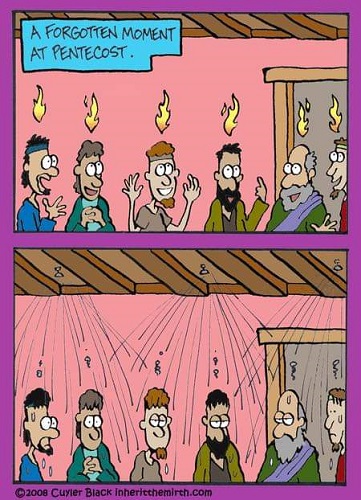


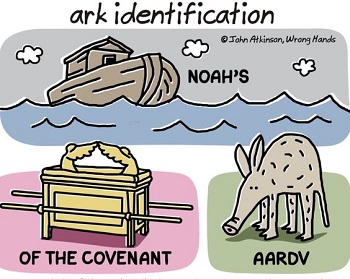








 Follow
Follow


